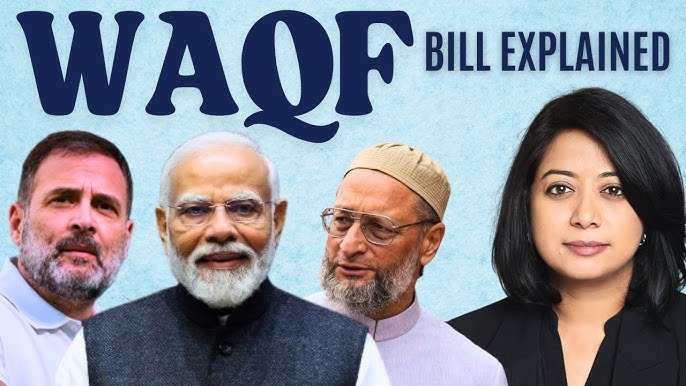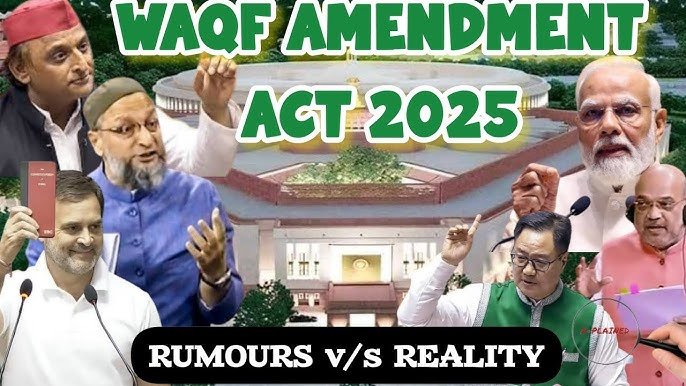=L What is the Waqf Bill?
The Waqf Bill is a legislative proposal aimed at regulating and reforming Waqf properties in India. Waqf (or Wakf) refers to a charitable endowment under Islamic law, typically involving property donated for religious or charitable purposes. Such properties are managed by Waqf Boards, and theyre spread across various parts of the country from mosques and dargahs to educational institutions and graveyards.
The Waqf Bill 2025 seeks to bring more transparency, accountability, and regulation to how these properties are governed, used, and protected.
=Ü Background: Understanding Waqf in India
Before diving into the bill itself, lets understand the backdrop.
-
Waqf properties are governed under the Waqf Act of 1995, which was amended in 2013.
-
According to official records, India has over 6 lakh Waqf properties, making it one of the largest holders of charitable real estate assets in the country.
-
These properties are valued at several lakh crores, yet many remain underutilized, mismanaged, or encroached upon.
The Central Waqf Council and State Waqf Boards are responsible for managing these assets, but over the years, there have been numerous allegations of:
-
Corruption
-
Illegal encroachments
-
Political misuse
-
Lack of proper auditing or records
=Ì Key Provisions of the Waqf Bill 2025
The Waqf Bill 2025 proposes several major changes aimed at tightening oversight and ensuring better utilization of Waqf properties. Here’s a breakdown of the most important clauses:
1. Digital Record-Keeping and GIS Mapping
-
Mandatory digital registration of all Waqf properties
-
Use of GIS mapping to mark boundaries and prevent encroachment
-
Public access to records via an online portal
2. Time-bound Investigation of Encroachments
-
Strict timelines for investigating and clearing encroachments
-
Involvement of local administration and police
-
Penalties for those found guilty of unlawful possession
3. Empowered Waqf Tribunals
-
Waqf Tribunals will be strengthened with quasi-judicial powers
-
Fast-track mechanism for dispute resolution
-
Decisions to be binding and final, with limited scope for appeal
4. Audit and Financial Transparency
-
Annual independent audit of all financial records
-
Mandatory disclosure of income, expenses, and property usage
-
Provision for CAG (Comptroller and Auditor General) oversight in certain cases
5. De-Politicization of Appointments
-
Appointments to State Waqf Boards to be made more transparent
-
Ban on politicians holding key Waqf Board positions
-
Requirement of educational and administrative qualifications for board members
=¥ Controversy Surrounding the Waqf Bill
The Waqf Bill 2025 has sparked significant debate and opposition, particularly among certain Muslim organizations, political parties, and civil rights groups.
=% Why is it Controversial?
-
Fear of Government Overreach
Critics argue that the bill allows the government to interfere in religious affairs and could lead to the state taking control of Muslim religious property. -
Lack of Community Consultation
Many feel that Muslim scholars, Waqf beneficiaries, and local communities were not adequately consulted before drafting the bill. -
Religious Autonomy at Risk?
Some believe the proposed reforms threaten the autonomy of Islamic endowments, and that such sweeping changes should only be made after building broad consensus. -
Political Angle
Opposition parties have accused the ruling party of using the bill to target minority institutions for political gain, especially ahead of elections.
=ó Political Reactions
The bill has divided the political spectrum.
-
The ruling party claims the bill is a progressive step toward transparency and will help protect Muslim heritage from corruption and land mafias.
-
Several opposition parties, including AIMIM and Congress, have either opposed the bill or called for wider debate and amendments.
-
Prominent Muslim leaders and organizations like Jamiat Ulema-e-Hind and All India Muslim Personal Law Board have raised objections, urging the government to roll back or revise the bill.
< Social Media Buzz
The Waqf Bill has become a viral topic on social media, with trending hashtags like:
-
#WaqfBill
-
#WaqfPropertyRights
-
#StopWaqfBill2025
-
#ProtectMuslimHeritage
Supporters argue it brings long-needed reforms, while critics see it as a move to centralize power and potentially infringe on religious freedom.
<Û Legal and Constitutional Implications
From a legal standpoint, the bill brings up important questions:
-
Does it violate Article 26?
(Right to manage religious institutions) -
Is it against Article 25?
(Freedom of religion) -
What about federalism?
Waqf matters are generally state subjects; the central government’s role is a matter of debate.
Several constitutional experts have called for a Supreme Court review of the bill if passed in its current form.
=È What It Means for the Future
If passed and implemented effectively, the Waqf Bill 2025 could:
-
Help recover billions in encroached Waqf assets
-
Improve educational and healthcare facilities using Waqf income
-
Provide jobs and economic upliftment in minority areas
-
Reduce corruption and land mafia control
However, without proper checks, it could also:
-
Centralize too much power
-
Undermine religious freedom
-
Spark communal tensions during implementation
>à Expert Opinion
Dr. Faizan Ahmad, a legal scholar on minority rights, said:
Transparency is important, but so is community participation. Reforms must not come at the cost of religious autonomy.
Similarly, urban development expert Prof. Anuradha Banerjee noted:
Digitizing and mapping Waqf lands is a brilliant move. But the execution must be fair and inclusive.
=Ì Conclusion: Reform or Overreach?
The Waqf Bill 2025 sits at the intersection of reform, religion, and rights. On one hand, it promises long-overdue modernization of a poorly managed sector. On the other, it risks creating distrust among minority communities if seen as coercive.
The success of the bill both politically and socially will depend on how well the government balances reform with representation, ensuring the community feels part of the process, not targeted by it.










